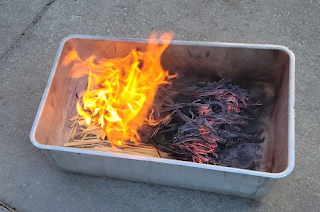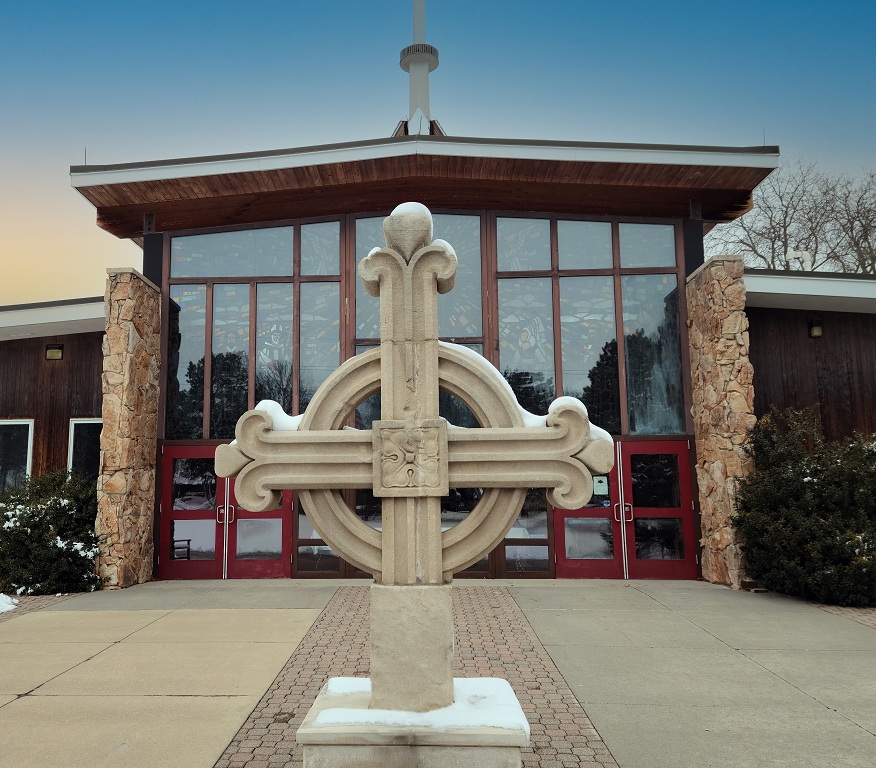"Thoughts and prayers" and the Ten Commandments
Have you ever just started out on the wrong foot in some situation, or in some new relationship? I had that happen recently when I started my chaplain internship at the hospital: It was about two weeks in, and my first night working with a particular chaplain I had not yet met in person. When I got into the office, she was out in the hospital somewhere, and so I picked up the phone on a desk and called her to let her know I was reporting in for duty. “WHY ARE YOU CALLING FROM MY PHONE? WHO WOULD CALL ME FROM MY OWN PHONE?” she said, in a voice just like that…Let’s just say it went downhill from there; it took a lot of time and effort to fix this relationship that started off all wrong.
Very sadly, I think that’s what our relationship with the Ten Commandments is like. From the beginning, because we call them “Commandments” and because we have childhood memories of Sunday School material with those two tablets of stone that start off with either “You shall…” or “You shall not…” we’ve begun our relationship with them as if they were a set of clean-cut rules, simple laws…as if they were commandments from a brigadier general to privates, or from a monarch to peasants….We need to do some hard work and effort and time to start over with our relationship with the Ten Commandments.
In the Hebrew Torah, as we see in today’s reading, the Ten Commandments don’t start out not with “You shall” or “You shall not” – they start out with God’s proclamation of his saving relationship to Israel: “I am the LORD your God, who brought you out of the land of Egypt, out of the house of slavery.” The giving of the law on Sinai comes after the burning bush, after the escape from Pharaoh’s army through the Red Sea, after the bread from heaven, after the water from the rock…after all the people of Israel have been consecrated to God. They aren’t commands to earn favor or salvation, they are responses! A proclamation by God of the proper responses from God’s community of liberated slaves, responses in thanksgiving for that liberation, responses that lead to a right relationship with God and a right relationship with each other. Because of God’s goodness, because of God’s saving acts and steadfast care and boundless love, these should be our grateful, joyful, responses.
The Ten Responses—that’s what we’re going to call them until this sermon is over—are broken into two halves: the first set describes our response in relationship with God, the second set describes our response in relationship with each other. You can see this division in Jesus’ explanation in Matthew 22 when the Pharisees ask him which is the greatest commandment, trying to trip him up. Jesus says, “The first commandment is love God with all your heart and soul and mind; and the second commandment is just like it: love your neighbor as yourself.” Love God; love your neighbor. Rather than getting into trouble by picking a single one to be above the others, Jesus picks all ten, summarizing them into their two halves.
If this were a sermon series, I’d take each of the Ten Responses and we’d do a ten-week exploration—but, since all I have is a few minutes, I’m just going to do some brief brainstorming with you on one of them. The familiar version of the Third Response says “You shall not take the Name of the Lord your God in vain,” or, in our translation today, which is better, “You shall not make wrongful use of the Name of the Lord your God.” That newer translation makes it more clear that this response is not about “bad” language—“wrong use” and “right use” of God’s name is about something much more important than obscenities. The Name of God invokes God’s power and God’s presence and God’s purpose. To have “wrong use” of the Name of God is to attempt to make God, to attempt to make God’s power, into a means for our own ends. This third Response, and the first two Responses before it, are talking about all the seductive ways we displace God, who created us and saved us and sustains us, from the rightful place in our lives, and put ourselves first, putting our own will in place of God’s will, putting schemes of our own making before God’s plans—they’re talking about all the ways we instrumentalize God and God’s power for our own use—all the ways we love ourselves more than we love God and more than we love our neighbor.
My friends, there have, as of yesterday, 11,844 gun deaths in the United States this year. There have been 554 children under the age of 11 shot, and 2,479 teenagers (gunviolencearchive.org). Since 2014—in only three years—total firearm injuries are up 50 percent. Shootings of children are up 30 percent. One week ago today, we watched the horror in Las Vegas, the largest mass shooting in modern U.S. history, unfold before our eyes. A mass shooting is defined as four or more people—since last Sunday in Las Vegas, there have been seven more mass shootings in the United States. One of them was next door to us, in Lawrence, Kansas. My indictment of us all is that for us to say, simply, that our “thoughts and prayers” are with the victims, is to take the name of God in vain. The phrase “thoughts and prayers” is blasphemy in the mouths of us all when we continue to let thousands die rather than threaten the covetousness of those who profit by the gun industry, blasphemy by us all when we put the idol of an idealized second amendment before our responsibilities for each other as Christians. Platitudes about prayer in the abstract are safe because they have no consequences—unlike real prayer, which always implicates us in the process of change and action. If we pray for an end to gun violence, we obligate ourselves to do all in our power to reduce it. Prayer is not simply leaving things up to God—prayer is an act of volunteering to be part of God’s solution. Prayer is a call for action.
You remember Jesus’ story of the Good Samaritan: before the hated, sinful, foreign Samaritan climbed into the ditch to help the beaten man, a priest and a Levite—two of the holiest leaders in the church—walked by on the other side. I have no doubt, being a priest and a Levite, they offered their “thoughts and prayers” as they did so. Jesus asks which was a neighbor to the injured man, and the answer is: “the one who took care of him.” And, you know why Jesus tells this story? It is in Luke 10, verses 27-37—In these verses, Jesus again summarizes the Ten Responses by saying “Love God, love your neighbor,” and a lawyer asks him, “but who is my neighbor?....who is my neighbor?”
In James chapter two, we hear, “If a brother or sister is naked and lacks daily food, and one of you says to them, "Go in peace; keep warm and eat your fill," and yet you do not supply their bodily needs, what is the good of that? So faith by itself, if it has no works, is dead” (Jas. 2:15-17 NRS). As Christians, for our only response to the personal and national tragedy of gun violence to be “thoughts and prayers” is for us to take the sacred act of prayer and turn it into something profane—to use the holy Name of God for our own, selfish purposes—to take the Name of God in Vain.
These are not the Ten Commandments; these are the Ten Responses—they are really the Two Responses: Love God, Love your neighbor. Like the lawyer, we seek to justify ourselves, to turn them into commandments rather than responses. We want to know the boundaries of our duties, we want to know when we can check them off as done, and so, like the lawyer, we ask Jesus, “but who is my neighbor?” Jesus replies to us today as he did then: “the neighbor is the one who showed him mercy. Go thou and do likewise.” The issue of gun violence, like all the important problems in our broken world, does not have an easy solution, does not have a single solution. To begin addressing it requires us to see everyone—left, middle, and right—even those on both extremes, as our neighbor, so that we can begin a dialog, and, together, find workable solutions. We are children of God and disciples of Jesus—we must not take the Name of God in Vain—we must not offer our “thoughts and prayers” as we walk by on the other side of the road—We must climb into this ditch and make a difference. Not because we’re commanded to, but because how can we respond otherwise to the gift of God’s wondrous, saving, love? “You shall not make wrongful use of the Name of the Lord your God….” Love God, love your neighbor. These are not commandments, but responses. “Go thou and do likewise.”



Comments
Post a Comment